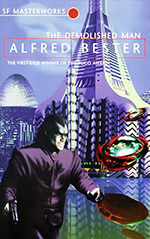
![]() Naomi_uk72
Naomi_uk72
1/30/2020
![]()
It's easy to see why this book garnered so much positive feedback when it first got published. It uses familiar tropes from detective fiction, a popular genre at the time, and transposes them into a forward thinking future where crime is almost non-existent and decadence seems to be the order of the day. The wealthy, pampered citizens of Bester's 24th Century are happy with their lot in life, even those who have to work, and while there is the seedy underclass that's so integral to any detective story, even this seems mostly to be a choice, rather than a result of circumstance.
In terms of the prose, Bester's style is punchy and immediate. For the most part what you see is what you get, which leaves the reader free to fully appreciate the in-depth character study of both Reich and Powell. It also cunningly obfuscates the implication of a society being slowly and subtly reshaped by the telepaths. We're so blinded by the rapid-fire manoeuvring, misdirection and manipulation going on between the two principal characters that we barely register what's going on behind the scenes.
In some respects this is very much a novel of its time. The decidedly fifties slang used in dialogue, the concept of Espers and telepathy as an accepted part of the setting, the colonisation of large parts of the solar system without need for sealed habitats, and so on make this very much a product of the post-war, pre-space age era. It's an optimistic view of a future that never happened, and never will, and yet it's a charming view despite the obvious inaccuracies. Even allowing for the pseudo-totalitarian presence of the peepers listening in on your every thought, it's still a future you might want to visit.
Even if you take into account the dated elements, this is still an exemplary novel. It draws you in and keeps you reading, never really sure where the plot is going to take you next. In this respect it perfectly encapsulates the detective novels it aims to emulate, keeping you on your toes with twist after twist. Even though you know whodunnit, you keep reading because you want to know how the bad guy's going to get his comeuppance at the end of the story. And when that ending comes, it's nothing like you expected.
All in all this is a fantastic book and it's hardly surprising it won that first Best Novel award back in 1953. When you compare it to the other works that came out at the same time it easily holds its own against the established talent of the likes of Heinlein, Asimov and Clarke. For a debut novel it truly stands out, and held the promise of greater things yet to come.
What's more, if you take out the obvious fifties dialogue and replace it with something more up to date it wouldn't be out of place alongside some of the works making their way on to the Hugo ballots of the modern age. It still stands the test of time, and was one of the original titles included in Gollancz/Millenium's SF Masterworks series at the turn of the century. As Harry Harrison said in his introduction to the 1996 reprint, it's "... a first novel that was, and still is, one of the classics."